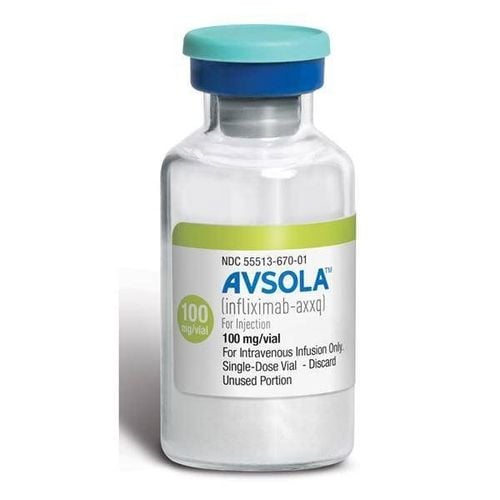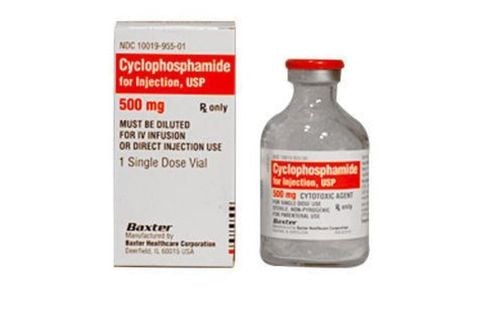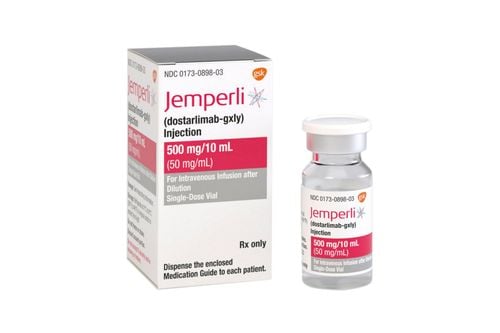This is an automatically translated article.
Denosumab is a monoclonal antibody used in the treatment of osteoporosis, treatment-induced bone loss, cancer metastasis to bone, giant cell tumor of bone... This is also the main active ingredient in Xgeva drug. .
1. What is Xgeva?
Cancer cells in some tumors (most commonly breast, prostate and lung cancer) have a high chance of spreading to the bone, which is called bone metastasis. Cancer cells in the bones can cause bone breakdown or wear, so the affected bones become more fragile. Bone metastases can be painful and can even cause bone to break due to damage to the cancer cells. The active ingredient in Xgeva is Denosumab. Denosumab is a monoclonal antibody designed to target a specific protein or cell - in this case, the target is a protein called RANKL, which is needed for bone breakdown. By targeting RANKL, Denosumab inhibits or stops bone breakdown.
Monoclonal antibodies are created in the laboratory to attach to targets found on specific types of cancer cells. This antibody will "call" the immune system to attack the cell it is attached to, resulting in the immune system killing the cell. These antibodies can act in a variety of ways, including stimulating the immune system to kill cells, stop cell growth, or other functions necessary for cell growth.
2. How to use Xgeva
Xgeva is usually given once every 4 weeks, by subcutaneous route (similar to insulin). Your doctor may ask you to take calcium and vitamin D supplements to help keep your bones healthy and prevent your blood calcium levels from getting too low. Patients should drink plenty of fluids while taking Xgeva. Try to drink 8-10 glasses of water a day, limit alcohol and caffeine drinks every day.
3. Possible side effects of Xgeva
Doctors can apply a number of different measures to control the side effects of Xgeva for each specific patient. The following are some of the most common and important Xgeva side effects:
3.1. Fatigue and weakness Fatigue is a very common symptom in patients undergoing cancer treatment. Fatigue is often not relieved by rest. While taking Xgeva and for some time afterwards, patients need to adjust their daily routine, spend more time in the day resting and try to limit energy used for more important activities. Moderate exercise, such as walking, is also a means of managing cancer fatigue.
3.2. Electrolyte abnormalities Xgeva may affect the normal levels of electrolytes (phosphorus) in your body. The patient's level of abnormalities will be monitored with blood tests. If a patient's electrolyte levels become too low, the doctor may prescribe specific electrolytes to be given intravenously or orally. Do not take any supplements without first consulting with your treating physician.
3.3. Nausea and/or Vomiting Patients should talk to their oncologist for a prescription for medications to help you manage this side effect of Xgeva . In addition, dietary changes can be helpful, particularly avoiding other causes of vomiting, which may include limiting overeating, avoiding greasy foods, and seasoning. or acidic.
3.4. Shortness of breath Xgeva medicine can cause shortness of breath, shortness of breath, if the patient has shortness of breath or sudden chest pain, call 911 immediately.
3.5. Constipation Patients should take some additional appropriate measures to prevent or relieve constipation including adding fiber to their diet (addition of fruits and vegetables), drinking 8-10 glasses of water per day, and limiting their intake of water. making alcoholic beverages. Using a stool softener 1 or 2 times a day can prevent constipation. If the patient has not had a bowel movement for 2-3 days, the patient should contact his/her health care team for recommendations on how to relieve constipation.
3.6. Low red blood cell count (anemia) Red blood cells are responsible for carrying oxygen to the tissues in the body, and a low red blood cell count can make a patient feel tired or weak. If the count is too low, the patient can receive a blood transfusion.
3.7. Diarrhea Diarrhea is a possible side effect of Xgeva that can lead to dehydration, and your doctor may prescribe certain medications to control this.
Limit the use of high-fiber foods, patients should eat bland; Avoid eating raw fruits, raw vegetables, whole grain breads, cereals, nuts; Use foods with soluble fiber such as ripe bananas, boiled potatoes, chips, white flour products or oatmeal; Drink enough water and limit alcohol or caffeine to prevent dehydration. 3.8. Less common but important side effects of Xgeva Hypocalcemia: Xgeva can cause blood calcium levels to drop below normal. Calcium and vitamin D supplements may be used to prevent calcium levels from getting too low. Signs of low calcium levels include: numbness or tingling sensation around the lips, muscle stiffness, convulsions, spasms or cramps. Allergic reactions: In some cases, patients may be allergic to Xgeva. Signs of an allergic reaction may include: a drop in blood pressure, difficulty breathing, swelling of the lips, rash, itching, and hives. If these signs appear during or after the injection, notify your healthcare provider immediately. Osteosarcoma of the jaw (ONJ): this is a rare side effect, however. Normally the upper jaw (maxillary bone) and lower jaw (mandibular bone) are usually covered by gum tissue, in the case of ONJ, this tissue is gone and the bone is exposed. Typical symptoms associated with ONJ are: pain, swelling or infection of the gums, loose teeth, exposed bone (usually at the site of previous extraction). Some patients may experience numbness or tingling in the jaw or a sensation of "heaviness" in the jaw. ONJs may be asymptomatic for weeks or months and are only recognized when bone is exposed. ONJs usually appear soon after a dental procedure, although not always. Stop treatment with Xgeva at least 3 weeks before any dental procedure. Before starting treatment, the patient should have a complete dental exam, clean and remove any teeth that are in poor condition, and the dentures should be checked for a snug fit. Patients should brush their teeth after meals and before going to bed with a soft toothbrush and floss gently once a day. If gums bleed, talk to your doctor to see if you can continue to floss. Check teeth and gums in the mirror daily to check for sores, swelling, loose teeth, pain, numbness or other changes and notify your doctor immediately. Femoral fractures: Xgeva may cause atypical femoral fractures with minimal or no fracture. If you have unusual thigh, hip or groin pain, contact your doctor immediately. Spinal fractures: Patients may be at increased risk of spinal fractures when Xgeva is discontinued, especially if they have a history of osteoporosis or other fractures. Report any new or worsening back pain immediately to your treating physician.
4. Does Xgeva affect fertility?
Exposure of the fetus to Xgeva can cause birth defects, so patients should not become pregnant or fathering while taking this medicine. Effective birth control is essential during treatment with Xgeva and for 5 months after treatment for women. It is advisable to consult a doctor before breast-feeding while taking Xgeva. Xgeva is a monoclonal antibody prescribed by doctors to treat certain cancers. In order to ensure effective use and avoid unwanted side effects, patients need to use prescription drugs or consult a doctor, professional pharmacist.
Follow Vinmec International General Hospital website to get more health, nutrition and beauty information to protect the health of yourself and your loved ones in your family.
Please dial HOTLINE for more information or register for an appointment HERE. Download MyVinmec app to make appointments faster and to manage your bookings easily.
Reference source: oncolink.org













